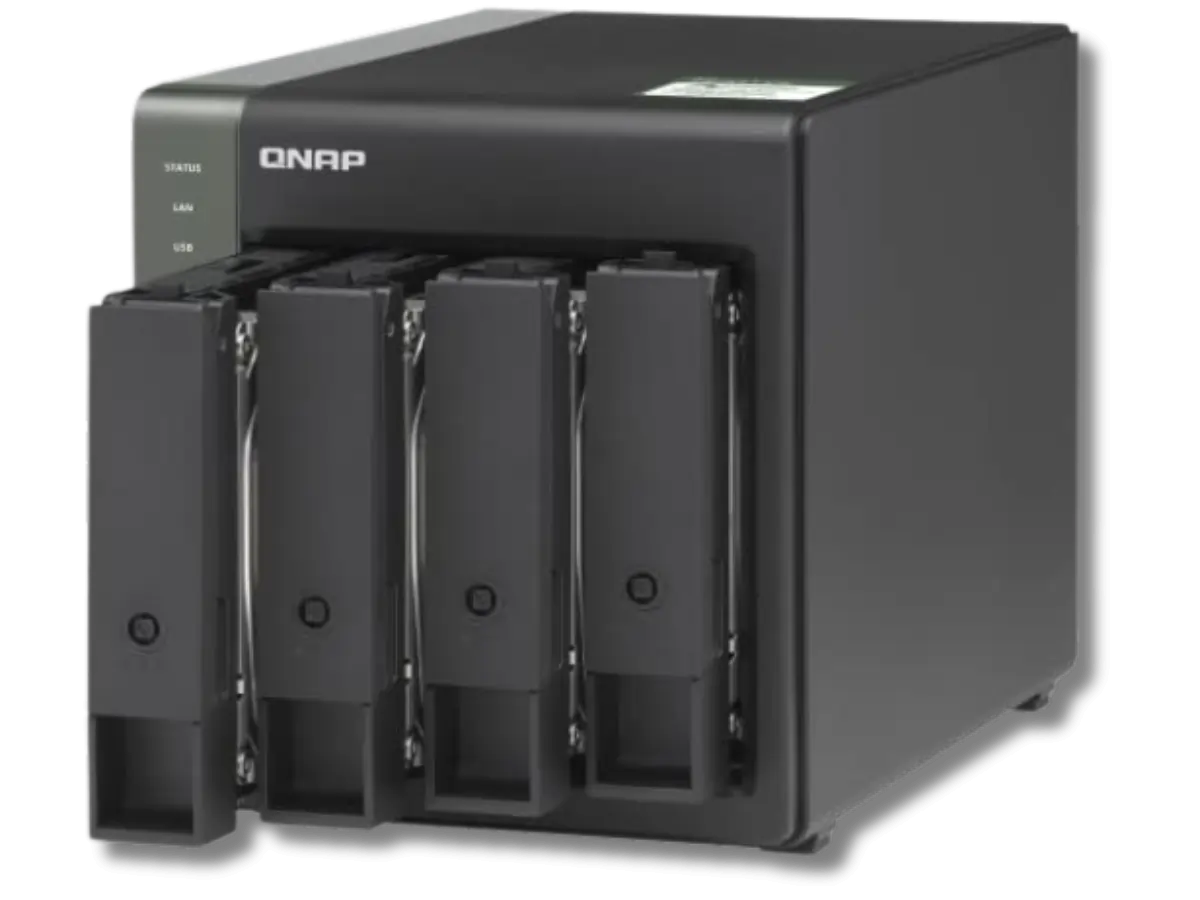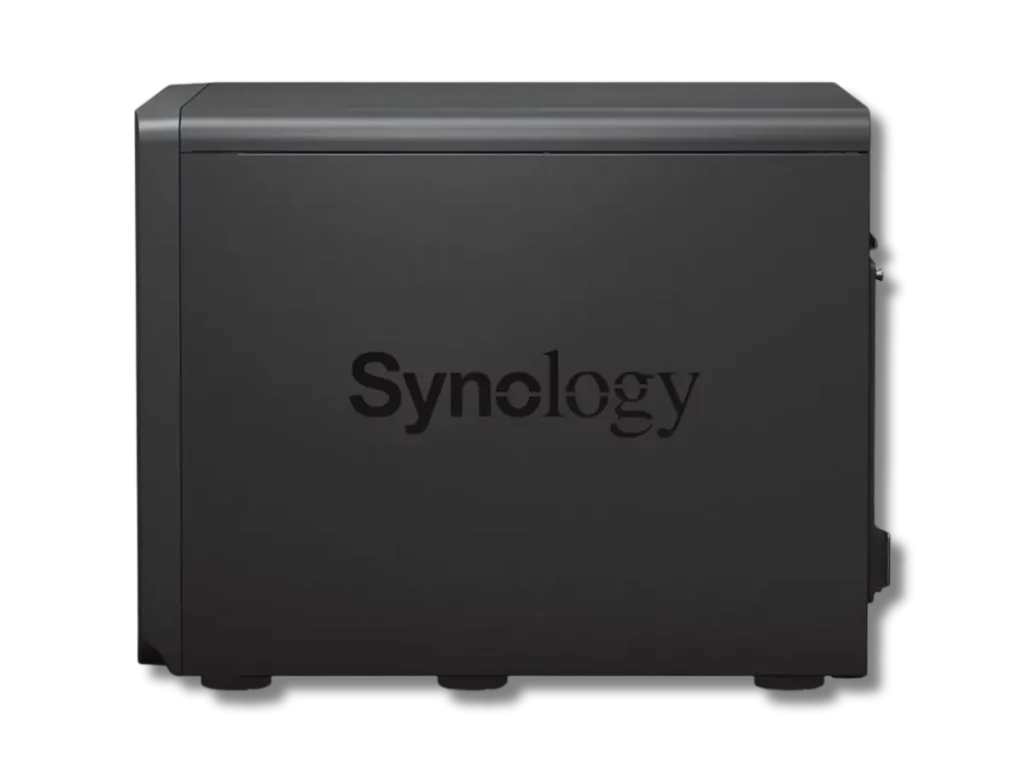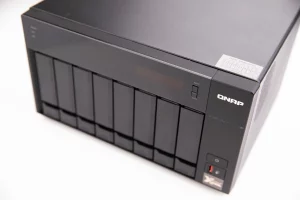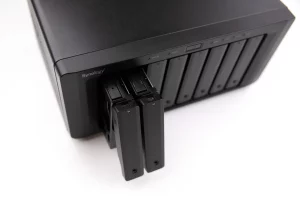If you are in the market for a Network Attached Storage device, you have probably come across two leading brands – QNAP and Synology. Both offer a wide range of NAS devices with various features and functionalities. But which one is the better choice?
In this article, we will compare QNAP vs Synology to help you make an informed decision.
Let’s start with a brief overview of both brands.
QNAP NAS
QNAP NAS devices come in many different models, from basic to advanced, to meet the needs of all kinds of users. They are known for being powerful and having lots of useful features. QNAP NAS devices run on the company’s operating system, QTS, which is constantly updated and offers a user-friendly interface.
Furthermore, QNAP NAS devices include a range of apps and add-ons enabling users to enhance their device’s functionality. These include media streaming apps, surveillance apps, virtualization apps, and more.
There are some popular QNAP NAS models, like the TS-451+ and TS-251A, which are highly praised for their performance and features.

Synology NAS

On the other hand, Synology NAS devices are known for their sleek design and ease of use. They also offer a wide range of models, from home to enterprise use. Synology NAS devices run on the company’s operating system, DSM, which is renowned for its user-friendly interface and advanced features.
Similar to QNAP, Synology NAS devices also come with various apps and add-ons that allow users to customize their devices according to their needs. These include photo organizing apps, office productivity tools, backup solutions, and more. Some popular models from Synology include DS224+ and DS918+.
Synology vs. QNAP - Feature Comparison
Both QNAP and Synology offer similar features, but some key differences set them apart. Let’s compare some of their features:
Operating System
Synology DiskStation Manager (DSM)
Synology DSM is known for its user-friendly interface and intuitive layout. It offers advanced features like data protection, file sharing, and media streaming. Moreover, Synology regularly updates the DSM with new features and improvements.
QNAP QTS (QNAP Turbo NAS System)
QNAP QTS also has a user-friendly interface and offers similar features to Synology’s DSM. However, it is more focused on advanced users who require complex functionalities like virtualization or surveillance.
RAID Configuration
Synology RAID
Synology NAS devices support traditional RAID configurations such as RAID 0, 1, 5, and 10. In addition to these, Synology offers Synology Hybrid RAID (SHR), which provides more flexibility and efficiency in disk utilization, especially when using drives of different sizes. SHR is user-friendly, allowing easy expansion without reformatting drives, making it ideal for those seeking simplicity and ease of use.
QNAP RAID
QNAP NAS devices also support traditional RAID configurations. Furthermore, QNAP offers additional flexibility with its RAID 50 and 60 options, providing higher fault tolerance and enhanced performance in larger NAS arrays.
QNAP’s RAID migration and expansion features allow users to expand their storage pool or migrate to a different RAID type without data loss. This is especially beneficial for businesses needing scalable storage solutions.
File System
Synology File system
Synology primarily uses Btrfs on their higher-end models, which offer advanced data protection features such as data integrity checks, snapshots, and efficient storage management.
Btrfs allows for automatic error correction and provides a robust environment for maintaining data integrity. For models that do not support Btrfs, Synology uses the EXT4 file system, which is stable and widely supported but lacks the advanced features of Btrfs.
QNAP File System
QNAP primarily uses the EXT4 file system for most of its models, which is reliable and widely supported. However, for its advanced enterprise-level models, QNAP offers ZFS through its QuTS hero operating system.
ZFS provides superior data protection features, such as real-time integrity checking, data deduplication, and high performance. It is particularly favored in enterprise environments for its robustness and advanced storage capabilities.
Hardware Specifications
Synology Hardware
Synology offers power-efficient NAS models focused on reliability and energy savings. The latest models feature Intel Celeron processors, ideal for everyday NAS operations and media streaming. With up to 16GB of RAM, these devices ensure smooth multitasking and handling of demanding applications.
Additionally, NVMe SSD caching enhances read/write speeds and overall performance while staying energy efficient. Synology’s reliable and cost-effective hardware makes their NAS devices popular for both home and business users seeking efficient storage solutions.
QNAP Hardware
QNAP provides high-performance options for users needing powerful hardware for advanced applications. Their NAS devices often feature Intel Core i3/i5 or AMD Ryzen processors, capable of handling virtualization and intensive data processing. With support for up to 64GB of RAM, QNAP models offer robust performance ideal for enterprise environments.
Additionally, QNAP NAS devices include extensive SSD caching and tiering capabilities, optimizing data storage and speeding up access.
Drive Bays and Expansion Units
Synology Drive Bays
Synology offers NAS models with a variety of drive bay configurations to cater to different storage needs. These configurations range from 1-bay, suitable for basic personal storage, to 24-bay models designed for enterprise environments. The available configurations include 1-bay, 2-bay, 4-bay, 5-bay, 8-bay, 12-bay, 16-bay, and 24-bay models, ensuring there is an option for every level of storage requirement.
Synology Expansion Units
Synology provides several expansion units for users needing to expand their storage capacity. Products such as the DX517, DX1215, and RX2417sas can be connected to existing NAS devices, allowing for seamless and straightforward storage expansion. These units are designed to integrate smoothly with Synology NAS devices, offering users flexibility and scalability.
QNAP Drive Bays
QNAP also boasts an extensive range of NAS models, from entry-level 1-bay systems to expansive 30-bay configurations for large-scale storage needs. Popular among these are 2-bay, 4-bay, 6-bay, 8-bay, 12-bay, 16-bay, and the larger enterprise models that can go up to 30 bays. This wide variety ensures that both personal and enterprise users can find a QNAP NAS that fits their specific requirements.
QNAP Expansion Units
QNAP offers robust expansion units to facilitate easy storage upgrades. Models such as the UX-500P, UX-800P, and REXP-1000 Pro can be connected to existing QNAP NAS devices, allowing users to scale their storage needs efficiently. These expansion units are designed to be user-friendly and offer seamless integration, making it simple for users to expand their storage capabilities as needed.

With their extensive range of drive bay options and expansion capabilities, Synology and QNAP cater to various needs, from personal use to large-scale enterprise applications.
Virtualization and Docker Support
Synology Virtualization
Synology offers virtualization through its Virtual Machine Manager (VMM) and Docker support. VMM allows users to create and manage multiple virtual machines on their Synology NAS, consolidating IT resources and running different operating systems simultaneously.
While VMM integrates with Synology High Availability and Snapshot functionality, it may be limited in high-performance applications compared to QNAP. For containerized applications, Synology supports Docker, simplifying testing and deployment for developers, though performance may not match QNAP’s capabilities.
QNAP Virtualization
QNAP excels in virtualization support with its comprehensive suite of tools for high-performance environments. Virtualization Station lets users easily run multiple virtual machines on their NAS, offering enhanced performance and flexibility. This is particularly valuable for businesses needing robust virtualization solutions.
Additionally, QNAP’s Container Station integrates Docker and LXC, enabling users to run applications in lightweight containers for increased efficiency and portability. QNAP’s Linux Station also supports Ubuntu, providing a full Linux environment for development, testing, and advanced applications. These features make QNAP a top choice for users requiring advanced virtualization and containerization.
Surveillance
Synology Surveillance Station
Synology’s Surveillance Station supports up to 100 cameras, providing an intuitive interface and broad compatibility with various camera brands. This makes it ideal for both small—and large-scale surveillance needs.
QNAP QVR Surveillance
QNAP’s QVR Pro surveillance system offers support for up to 128 camera channels and includes advanced features like event management. It is compatible with a wide range of cameras, making it a robust and flexible option for comprehensive surveillance setups.
Cloud Integration
Synology offers seamless integration with various cloud services, ensuring efficient storage solutions. Their NAS devices integrate effortlessly with Synology C2 cloud services and other popular providers like Amazon S3, Google Drive, and Dropbox.
QNAP offers robust cloud integration via QNAP Cloud and myQNAPcloud services. These tools let users create hybrid cloud environments that work seamlessly with major providers like AWS, Azure, and Google Cloud.
Which NAS is Right for You: QNAP or Synology?
Both Synology and QNAP offer a wide range of features and options to cater to different storage needs. Ultimately, the best NAS for you will depend on your specific requirements and budget.
If you need a reliable and user-friendly NAS with extensive cloud integration, Synology could be the ideal choice. On the other hand, if you require powerful hardware for virtualization or surveillance applications, QNAP may be the better option.
Consider your storage needs carefully and research both brands’ product offerings to determine which NAS is the best fit for you. Both Synology and QNAP are reputable and reliable brands in the NAS market, so you can’t go wrong with either choice. Whichever brand you choose, investing in a NAS device can greatly benefit your storage capabilities and enhance your overall digital experience.
FAQ About QNAP NAS vs. Synology NAS
Is QNAP better than Synology?
It depends on your specific storage needs. QNAP may be a better option for high-performance applications, virtualization, and surveillance, while Synology excels in user-friendly interfaces and cloud integration.
Are QNAP and Synology the same company?
No, QNAP and Synology are two separate companies that specialize in NAS devices. However, they both offer similar features and options for storage solutions.
How do I choose between QNAP and Synology?
Consider your specific storage needs, budget, and desired features when choosing between QNAP and Synology. Research their product offerings and compare them to decide which brand offers the best fit for you. Both are reputable and reliable brands, so you can’t go wrong with either choice.
Can I move drives from QNAP to Synology?
Yes, you can move drives from QNAP to Synology, but it may require reformatting and setting up the drive for use with the new NAS. It is recommended to backup your data before making any changes. However, it is best to refer to each brand’s specific instructions and compatibility requirements before attempting to move drives between devices.
